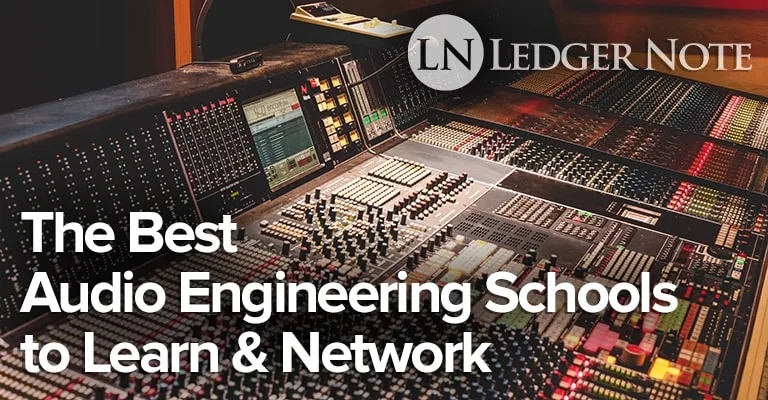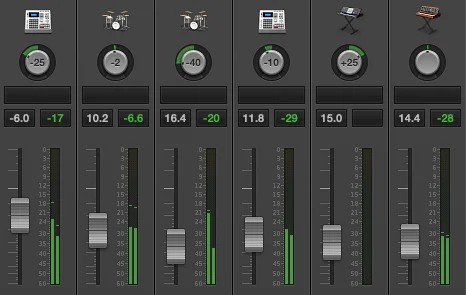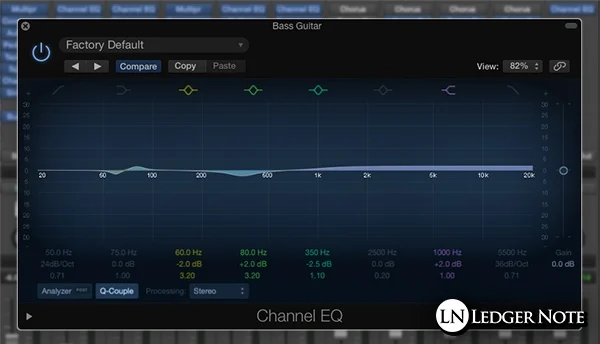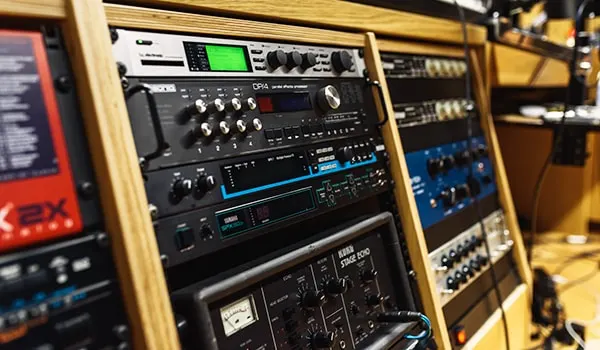
Although it can be challenging to choose the best audio engineering school or college for you, given the plethora of options available to you, don’t let the options overwhelm you.
Instead, let yourself be excited about the multiple choices — you’re that much closer to achieving your sound engineering or music producing dreams than you realize.
Before you make a decision, make sure you have a good foundation of knowledge and understanding about audio engineering schools and colleges. We’ve got you covered with everything you need to know about these sound engineering schools.
Things to Understand About Audio Engineering Schools
If you’re considering where to go for a degree, you’ll need to do some research and reading. Luckily for you, we’ve broken down everything you’ll need to know about audio engineering schools and colleges.
What Do We Mean By Audio Engineering?
Audio engineering is pretty similar to being a music producer. They both work in the recording studio, can edit, record and mix audio sound, and will have to work with arrangers, singers, record producers, musicians, and management.
Oftentimes, people choose to work in both audio engineering and music production, though music production schools offer a different curriculum with a far different focus, though the skills have heavy overlap.
As an audio engineer, the specific work that you do will depend on the job itself. Recording is an essential position within studio work. Audio engineers in this position might tune instruments, run cables through outboard audio gear, place microphones, and of course, record audio.
Mixing is another aspect of audio engineering, which consists of taking specific audio tracks and combining them into a clear, comprehensive experience. With this position, you might make sure each instrument sounds good individually and in context, pan between stereo channels, or balancing audio levels, so instruments like drums don’t drown out the vocals or guitar, and vice versa.

Lastly, mastering is a concept that audio engineers employ. You’ll take recordings that are mixed and finished, and process them for a final polish. That means using techniques like limiting, tweaks, and compression. It can also mean adding meta-data for online distribution, making sure each track of an album has the same relative volumes, etc.
There are even some audio engineers that aren’t involved in any of those common positions. Some choose to explore commercial production, video game audio design, film post-production, and radio broadcasting.
But regardless, with audio engineering, the ultimate goal is to produce the best sound possible.
Do I Really Need an Audio Engineering Degree?
If you’re researching and looking for audio engineering schools, or if you’re simply hoping to get a job in the music industry, there’s a good chance that you’ve asked yourself, “Do I really need this audio engineering degree to be successful?”
The answer is no. The most important thing you need to have a career in audio engineering is skill. Many people in the music industry don’t care if you have a diploma or a degree. In this business, the reality is you need to be able to do your job well.
If you’re skilled at editing and mixing music, as well as communicating with your clients, you’ll be successful. You won’t be able to walk into a recording studio and snag a job if you don’t have the required skills you need to do the job.
That being said, the real question boils down to, “Do you have the audio engineering skills to get the job you want?” If the answer is yes, you’re in the clear.

However, if you’re looking for a typical day job in the music industry, employers often want to see a degree on your resume from an accredited school. In this case, you’ll want to seriously consider earning an audio engineering degree.
Even if you’re not looking for a typical day job, there are some benefits to attending an audio engineering college or school. Check out the advantages in the next section.
The Real Benefit of Attending an Audio Engineering College
I’d be remiss if I didn’t mention the core benefits of attending an audio engineering school or college to get a degree. Below are the top benefits you’ll reap if you choose to go to a specialized school.
Location & Vocation
Many top audio engineering schools and colleges are in cities that feed the music industry. We’re talking about cities like Nashville, New York, and Los Angeles.
For many, going to school in a city like these means you’ll be able to not only get a better education, but you’ll be able to potentially find even more job opportunities and better quality jobs at that.
Networking & Relationships
In the music industry, networking and relationships are everything.
When you go to an audio engineering college or school, you get the opportunity to meet more people who aspire to move into the music industry to build a career. The relationships you build at school can be leveraged later.
These relationships could mean meeting new like-minded friends or connecting with music producers and professors who know music industry professionals. Either way, the relationships side of going to audio engineering school is a huge plus.
Audio engineering jobs often come to people through referrals and connections, which is vital to succeeding in the music industry.
Work Experience
Attending an audio engineering school or college is one of the best ways for you — as a budding sound engineer or music producer — to build your resume.
Many audio engineering schools have resources for you to get feedback and critiques on your resume and cover letters, and some even provide electronic press kits (EPKs) or even professional headshots. All of these things can help you stand out to recording studios and potential employers.
By joining clubs or organizations through your program, you’ll also be able to connect and pick the brains of graduates or professionals who have connections with brands and companies, or even artists.
You might even be able to snag an internship — for the added experience to buff up your resume — or simply get hands-on experience working at a college radio station to learn how to use all of the tools.

In the same vein, another pro of going to an audio engineering school or college is the access you’ll get to some of the most dynamic equipment available. These programs usually use only the best equipment, so you’ll get to train and practice with expensive sound desks and gear. It’s also a helpful skill to add to your resume — that you were trained with some of the best equipment out there.
The Best Audio Engineering Schools
There are hundreds of audio engineering schools and colleges to choose from — just in the United States alone — that can offer you specialty classes and electives through their respective programs.
Due to the number of impressive schools out there, it can be a bit overwhelming to explore all your options at once. Here’s a sampling of some of the best audio engineering schools and colleges. You can click on any of the choices to request more information from each: [Edit: Tool Removed]
But which ones stand out as the best of the best? Here’s a handful more prestigious audio engineering schools and colleges (there’s countless more beyond these):
- New York University – New York, NY
- California Institute of the Arts – Valencia, CA
- Berklee College of Music – Boston, MA
- Georgia State University – Atlanta, GA
While you’re at it, take a look at the other types of music majors available. You may find them more interesting and they can open up a wide range of career options you find more appealing.
Typical Courses & Electives in Audio Engineering Schools
Of course, courses and electives in audio engineering schools will prove very helpful for developing the necessary skills you’ll need as someone who wants to work in the music industry.
There’s a handful of standard courses and electives that you’ll most likely have the opportunity to take. Many of the electives will be real-word opportunities, like internships or learning about project studio design and electronics.
The courses you’ll take will include subjects like recording techniques, critical listening, music business courses, music production, recording theory, mixing essentials, and introduction to live sound and post-production. Of course, there are many more classes you might decide to take — these are just a few of the most common courses you’ll encounter.
Through these classes, you’ll learn things like:
- Pre-Production & Tracking
- Mixing
- Mastering
- Automated Dialogue Replacement (ADR)
- How to Engineer In-House Concerts
- Ear Training
One of the best parts about taking courses and electives at an audio engineering school or college is the fact that they’re taught by instructors who have real music industry experience. These expert professors can only help you in regards to good advice, informative courses, and possible connections for the future.
Audio Engineering Schools Can Launch Your Career
Thanks to the many advantages and skills you’ll learn at an audio engineering school or college, getting a degree can launch your career or even solidify it.
The experiences and connections you make at an audio engineering school will stay with you forever, and the courses you take will provide you with invaluable information that will help you in your career in the music industry.
Although these programs aren’t for everyone (many in the industry are self-taught), they certainly can have a hand in launching your dream career.